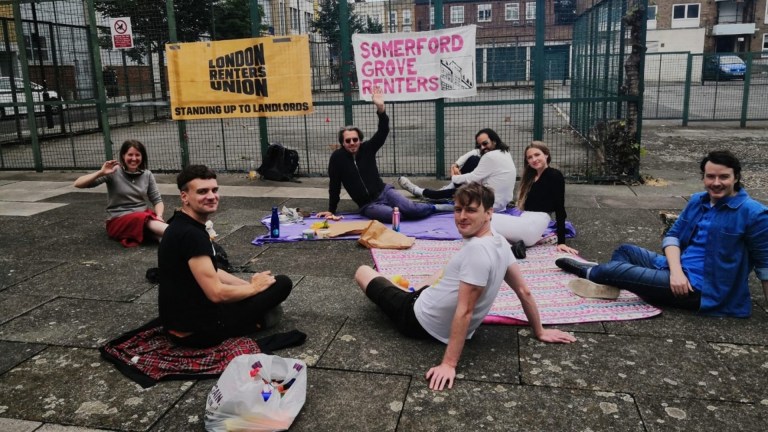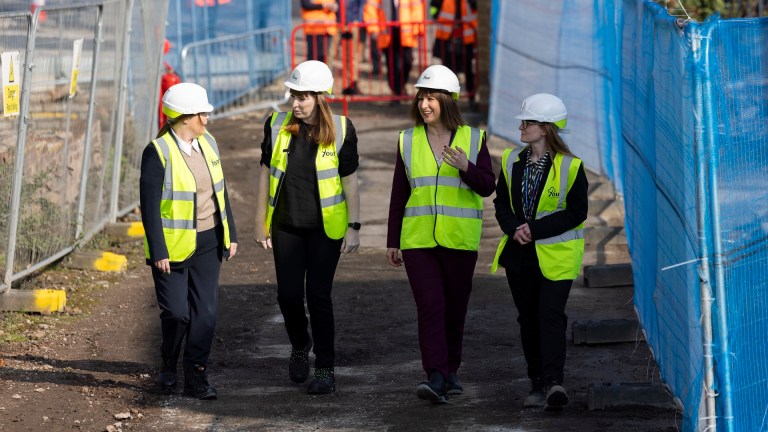“It was a pretty rubbish day. I just did not know what on earth was going on, I was completely untethered.”
I would like to see the protections extended further than that, because at the minute I feel like I’ve got handcuffs on and there’s nothing I can do about itLisa Harding
Despite being furloughed off and on since the pandemic hit in early March last year, Lisa insisted she has been able to keep up with rent payments.
Lisa has been attempting to find a new rented property but has found being furloughed to be a stumbling block. The same has been true for getting a mortgage to buy the two-bedroom terraced house from her landlord, who Lisa insisted she does not blame for selling the property during the pandemic.
These issues have Lisa fearing homelessness when the eviction is due to be carried out on September 25. Lisa told The Big Issue she has approached her local authority for support but is worried that she could be forced to stay in a homeless shelter or sleep in her car after September.
“I’m 49 years old, but I’ve worked my entire life. I’ve never been in this position before,” added Lisa.
“But I’m absolutely terrified. In all of my life, despite other challenges and being made redundant, I’ve always found a way to be able to pay my rent and keep my roof over my head.
Advertising helps fund Big Issue’s mission to end poverty
“I’m relatively lucky in that I hopefully have a job to go back to. But if you don’t, what on earth are they going to do about that? No job, no home, we are looking at a terrifying cliff edge.
“I would like to see the protections extended further than that, because at the minute I feel like I’ve got handcuffs on and there’s nothing I can do about it.”
The Westminster government brought in a full eviction ban between March and September last year as England went into the first Covid-19 lockdown and it returned over Christmas as part of a ‘winter truce’.
Bailiffs have been unable to carry out evictions since the latest national lockdown at the start of 2021 with six-month notice periods introduced to give tenants time to prepare for evictions.
But bailiff-enforced evictions can now commence from June 31 while notice periods have been shortened to four months.
Announcing the plans on May 12, housing minister Christopher Pincher said the rules will ensure “tenants continue to be supported with longer notice periods while also balancing the need for landlords to access justice”.
Advertising helps fund Big Issue’s mission to end poverty
But homelessness and poverty charities have warned renters will face homelessness, with many racking up thousands of pounds in arrears while on furlough or without work.
JRF analysis found around 400,000 renting households have either been served an eviction notice or have been told they may be evicted during the pandemic.
In addition, one million renting households worried about being evicted in the next three months. That amounts to just over 10 per cent of all renters while half of the household represented families with children.
JRF have called for a targeted package of grants to support renters in arrears, administered through the existing discretionary housing payment (DHP) system which allows councils to give out grants to help people with housing costs.
But while the government has boosted DHP payments during the pandemic, JRF have warned the £180m available through the system is “nowhere near sufficient to support the 450,000 renters in arrears”.
Rachelle Earwaker, economist at JRF said: “If we are to experience an economic recovery which benefits everyone across the country, the government must urgently take action on rent arrears.”
Advertising helps fund Big Issue’s mission to end poverty
Meanwhile, Shelter have urged the government to back up their promise to scrap ‘no-fault evictions’ and set up a fund to help renters with arrears.
The housing charity found 3.2 million private renting adults say their experience of finding and trying to keep a home makes them worry about finding another home in the future.
Polly Neate, chief executive of Shelter, said: ”Thousands of people will wake up on the 1st of June knowing they’ll soon be kicked out of their home, with nowhere to go.”
It’s not just tenant groups that are calling for financial aid – debt charity StepChange warned around £360 million of Covid-related rent debt has been accrued during the pandemic. The National Residential Landlords Association (NRLA) is making the same plea.
NRLA chief executive Ben Beadle demanded “a financial package which ensures that benefits cover the rents of those in receipt of them” and for an interest-free tenant hardship loan to be established for those without benefit support.
Advertising helps fund Big Issue’s mission to end poverty
Tenants facing eviction as protections end must also be given urgent legal advice to avoid homelessness, warned Law Society of England and Wales president I. Stephanie Boyce. She added: “The earlier the advice can be received the better.”










